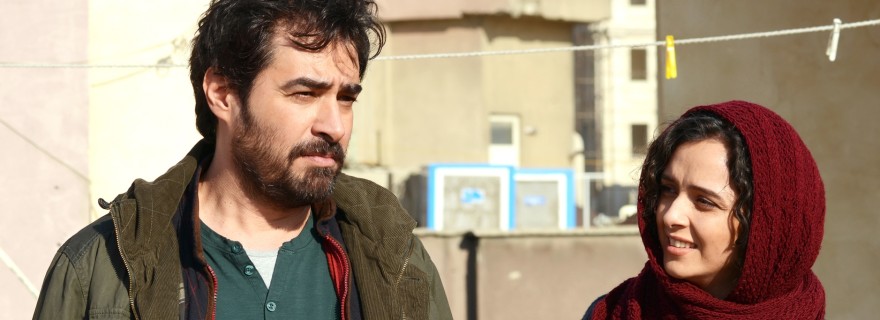'The Salesman'
Movie Rating:
4
‘The Salesman’ is a small and powerful film that likely wouldn’t have registered to many viewers beyond those already intrigued by Iranian cinema or the work of Asghar Farhadi (‘A Separation’). Then an unfortunate border-closure ban from a certain unfortunate politician meant that Farhadi couldn’t attend this year’s Academy Awards despite being nominated (and he’s made it clear that he wouldn’t want to attend even if given special permission to cross the border).
That has suddenly gotten ‘The Salesman’ far more attention than it might have otherwise attained. Fortunately, this tightly-wound character piece and thriller is strong enough to deserve it. Granted, it’s likely not Farhadi’s finest feature to date, but only because his output is so strong and consistent. Nonetheless, this is an impressive movie from one of the more interesting filmmakers of his generation, who deserves this brighter spotlight on his work even if it’s happening for the wrong reasons.
The film opens with the apartment of Emad and Rana (Shahab Hosseini and Taraneh Alidoosti) literally crumbling around them due to construction next door. They quickly find a new but shabbier place that the previous tenant abandoned quickly and left a collection of her belongings behind. Initially, they consider this little more than an inconvenience and don’t think much about it. They’re also co-starring in a production of ‘Death of a Salesman’ every night, so they have quite bit going on in their lives that’s emotionally draining at the moment. One night, Rana buzzes someone up to the apartment, assuming that it’s her husband. It’s not. The former occupant of the apartment was a prostitute and one of her former clients bursts in and abuses Rana. Emad arrives to find blood on the floor and his wife in the hospital. She won’t say what the abuse entailed, and he becomes obsessed with finding out what happened and who assaulted her. Eventually, he discovers the culprit and, well, it isn’t pretty, but not necessarily in the ways that you’d expect.
As always, writer/director Farhadi shows remarkable care and affection for his characters. The film easily could have been a ‘Death Wish’ type tale, but Farhadi isn’t interested in simple genre thrills or melodramatics. He doesn’t show the assault nor does he even allow the characters to discuss it in detail. Instead, the film is a study of how the event slowly rips apart and shatters these two lives in different ways. Thankfully, the director doesn’t dwell too deeply on any comparisons between his story and the Arthur Miller play that his characters are portraying on stage. Little things are implied, and it’s not an accidental choice, but Farhadi doesn’t get metatextual or dwell on references. It’s just another stress in this couple’s lives that’s tearing them apart. Watching them collapse is excruciating. Watching the way that Emad attempts to make things right is somehow even worse.
The central performances are extraordinary. Both Shahab Hosseini and Taraneh Alidoosti are regulars for the filmmaker and he obviously crafted this film with them in mind. Alidoosti is a study of pain and struggling dignity as a woman desperately trying to cope with PTSD following her assault. She breaks down but tries to march on almost hopelessly in ways that are hard to watch. That has a massive effect on Hosseini’s character, who flies through rage and vengeance with an obsessive compulsion. He’s both furious and powerless, unsure of exactly what he needs to do but determined to fight anyway. It’s painful yet fascinating to watch the two characters collapse and struggle to prop each other up. As the story moves into vengeance mode, there’s little sense of catharsis or excitement. Farhadi’s focus is entirely on people, and the way in which the story wraps up is at once completely unexpected and inevitable.
There are no heroes or villains here. No happy ending. No tragic finale. Just the messy entanglements of life and the ways in which violence destroys everyone it touches. ‘The Salesman’ is a strong, scarring and memorable piece of work from a filmmaker who seems to crank out those sorts of movies with ease. Hopefully, all of the bizarre controversy surrounding the film and its Oscar nomination will draw more attention to Asghar Farhadi and his career. Not because it’s politically charged, and not because it’s culturally relevant. Simply because this is a fantastic and unique filmmaker who only seems to be getting better at his craft. Maybe someday he’ll be allowed into America as well, despite having the audacity of being born in Iran. Anything is possible.




cardpetree
“Then an unfortunate border-closure ban from a certain unfortunate politician meant that Farhadi couldn’t attend this year’s Academy Awards”
This is incorrect. There is a moratorium on refugees from 7 countries, Iran being included, but it’s likely with a visitors visa that this man could have been cleared and travelled to the United States. But as you state “he’s made it clear that he wouldn’t want to attend even if given special permission to cross the border”. Guess it doesn’t really matter if you’re providing inaccurate information or not.
Josh Zyber
No, this is not true. The executive order, which was signed January 27th, bans all refugees (regardless of country of origin) for 120 days and bans all citizens from seven countries (Iran, Iraq, Libya, Somalia, Sudan, Syria and Yemen) from entering the United States for 90 days. Visitor visas are being rejected and new ones are not being issued for those countries. Over 100,000 visas have been revoked.
Farhadi, an Iranian citizen, would not be allowed into the country to attend the Oscars on February 26th.
Julian
Libya too? Darn, no plutonium for America, then.
cardpetree
I stand corrected. My apologies. I thought some people were detained and then allowed into the country.